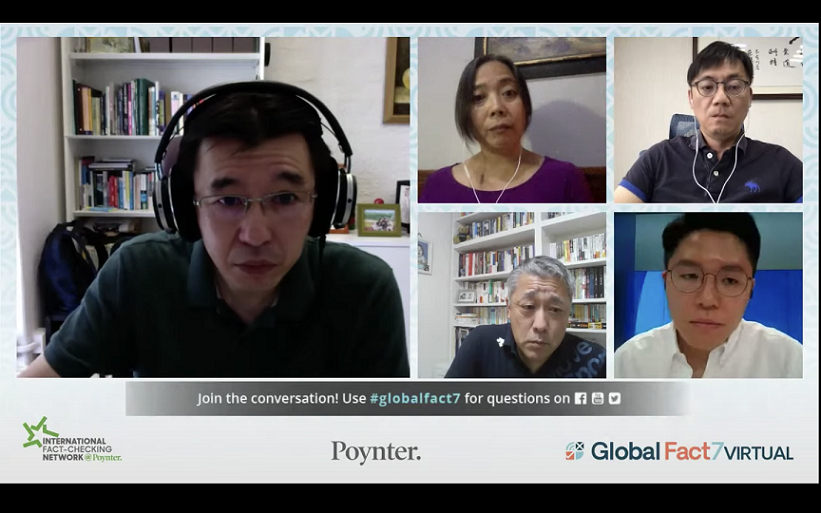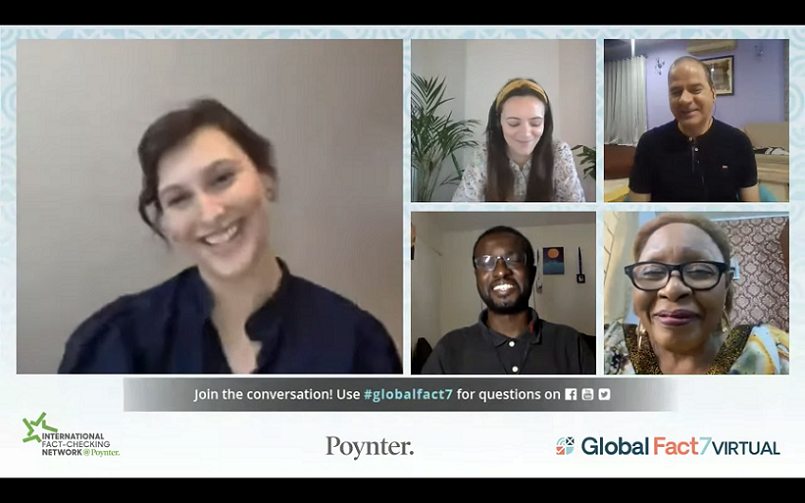The Covid-19 pandemic has given rise to authoritarianism, alleged foreign news manipulation and invasion of privacy in some countries in Asia, four fact checkers from Asia said during an online forum at Global Fact 7 organized by the International Fact-Checking Network on June 24.,
Gemma Mendoza, Rappler’s Head of Research, Partnerships and Strategy, said fact-checking in the Philippines, which had one of the world’s longest and strictest lockdowns, became more challenging as the government passed a law declaring a national emergency due to Covid-19 which included sanction on those who spread “false information.”
The Duterte administration has had a rocky relationship with the press and its critics long before the pandemic. ABS-CBN, the country’s largest broadcast network, has been shut down. Rappler, an online publication known to be critical of the administration, has also been facing a number of legal cases and attacks.
Save for the questioning of a government official who has a large social media following, Mocha Uson, for her controversial posts, there has been no moves against pages known to spread misinformation nor those making claims against journalists, administration critics and media institutions, Mendoza said.
“Government has been proven to have a huge network of websites, pages, and groups that promote government messaging and attack reports critical of administration programs,” she added.
This network has a lot of false claims and memes that demonize, call for the arrest or for violence and harm against administration critics. At times, official government pages amplify such content as well.
Examples of this are a falsely attributed quote meant to put Sarah Elago, a leader aligned with the political left, in a bad light and a post suggesting a former National Union of Journalists of the Philippines head went up to the mountains and connected with a rebel group.
Mendoza did note that with more time at home, citizens became more critical of the government’s response to the pandemic and so pro-government messaging was not as effective as it was before.
Mendoza mentioned the additional pressure from the draconian Anti-Terrorism Bill which authorizes warrantless arrests up to 24 days.

In Taiwan, Robin Lee of MyGoPen said some misinformation they have traced originated in Weibo, a Chinese microblogging site. Though simple to debunk, a deeper look shows that “it is probably organized, someone is trying to attack the general public in Taiwan,” he said
Lee related that in January, a message downplaying the virus as “just pneumonia in the mainland [China]” was simultaneously spread by a large number of users across social media platforms in Taiwan. The same message, written in local languages, also spread in other Asian countries.
Chat groups and social media saw Chinese’ fabricated official documents for a lockdown of Taoyuan city and a faked notice claiming all national health cardholders will be given ten free masks. Such information tries to create chaos and public panic, Lee said.
Lee further related the incident about a video which capitalized on language barriers in an attempt to shift blame away from China by using a Japanese news clip with a misleading translation. Upon actually translating the All-Nippon News Network clip, Lee’s team found that it did not claim COVID-19 originated in the U.S. nor was it transmitted to Wuhan during the military world games.
Politics aren’t the only hurdles faced by fact checkers. Culture also plays a key role in how the media needs to communicate information during the pandemic.
South Korea’s aggressive contact tracing played a key role in beating the virus but Gahyeok Lee, of the JTBC Fact Check said “communities or neighborhoods being accused of [spreading] COVID-19 can easily become targets of hate.The media clearly helped the hatred grow.”
“ I believe fact-checking can help (counter) that problem,” he said.
Lee shared the dilemma they faced when they fact- checked an outbreak connected to a gay club in Itaewon in May this year.
He said local reports highlighting sexual orientation and identity were compounded by a lack of statistical basis and only served to fuel hate against the LGBTQ community.
Lee also shared their experience about a viral video of a woman, wearing a paper arm patch used to mark COVID-positive patients, seemingly causing traffic in Dagu. In the process of confirming the story, Lee’s team found that she did not have the virus but she did have a mental illness.
These privacy breaches happened despite the government’s prevention guidelines prohibiting unnecessary disclosure of personal information. It also went against South Korea’s code of press ethics which promotes social responsibility and discourages discrimination.
Given that the problem lay in the framing and presentation of news, JTBC responded by critiquing news coverage and starting a campaign to change reportage. They also focused on debunking that the woman was COVID-positive instead of highlighting her mental illness.
Authorities later introduced anonymous testing, which excludes personal information when sending out alerts to the public. This helped lessen discrimination and resulted in an increase in testing.
Yoi Tateiwa of FactCheck Initiative Japan said an attitude change is needed when it comes to fact-checking people in positions of authority.
He said in some instances, they had to explain that there is a difference between criticizing a statement and criticizing the person who made the statement and that they were not accusing anyone of doing anything. Rather they wanted to confirm if a certain claim was true or not.
He cited as an example a story in mainstream media about the head of Japan’s task force against COVID-19 linking an increase in testing to an increase of deaths.
But when Tateiwa’s team cross-checked testing and death rates for other countries, they found this claim to be false. Upon publishing this fact-check, the team got berated for supposedly criticizing an individual in government.
Tateiwa says that even Prime Minister Abe sometimes says things that are not true during his press conferences, yet mainstream media runs the story. Despite acknowledging the importance of fact-checking, changing the bureaucracy inside newsrooms will take time, he said..
Global Fact 7 is a week-long virtual conference with more than 150 speakers from over 40 countries. This session is part of the free public track whose sessions were streamed from June 22 to June 26 and remain accessible on https://virtual.globalfact7.com/.
Laurice Sy is a University of the Philippines student writing for VERA Files as part of her internship.
